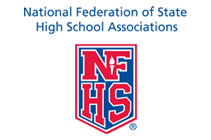Proper Appeals: Live ball/Dead ball
|
OBR: 5.09(c) A proper appeal must be made while the ball is live, and may only be made by defensive players on the field. |
FED: 8-2-6 Appealing the failure of a runner to touch a base advancing or retreating, and/or failure to tag up, can both be either a live-ball or dead-ball appeal. Live ball appeal must be a proper appeal; dead-ball appeal may be made by manager or any defensive player by clearly indicating the nature of the infraction. |
Substitutions: Re-entering starters
|
OBR: n/a OBR has no provision for re-entering starters. Once a player is removed from the game, they are done for the day. Note, however, that many amateur leagues that use OBR have supplementary substitution rules which typically follow the FED rule. |
FED: 3-1-3 A starter may re-enter one time, but must re-enter in same position in batting order where he started. On the other hand, a substitute, after entering and then being replaced, may not re-enter. |
Substitutions: Illegal substitute
|
OBR: 5.10(d) No penalty. Remove illegal substitute from the game. Any action by the illegal substitute stands. |
FED: 3-1-1 Illegal substituted is restricted to the bench for duration of game. If same player re-enters, he is ejected. |
Game ended by darkness or weather: Suspended vs. ended game
|
OBR: 7.02 A game that is halted prior to its completion by darkness or weather becomes a suspended game. |
FED: 4-2-3 Once it becomes an "official" game (five full), a game terminated by darkness or weather, and if inequal turns at bat, score reverts to last completed inning unless home team at bat achieves winning score. |
Shortened game: Mercy rule
|
OBR: n/a No mercy rule. However, many amateur leagues that follow OBR have adopted league (or local) rules providing for a mercy rule. |
FED: 4-2-2, CB: 4-2-2 Game ends on 10-run advantage after five full innings, or 4-1/2 if home team leads (that is, "official" game). The game may end after three full innings if both coaches and UIC concur. |
Umpire touches or handles live ball
|
OBR: 5.12(b)(5) If the umpire wishes to inspect the ball, he shall call time. If the umpire otherwise handles a live ball, but the umpire release the ball immediately, the ball remains live; otherwise, the ball is dead. |
FED: 5-1-1-h The ball is dead immediately any time the umpire handles a live ball or calls “Time” for inspecting the ball or for any other reason or gives the “Do Not Pitch Signal.” |
The umpire's juridiction begins when …
|
OBR: 4.03 Umpire jurisdiction begins when lineups are exchanged at the plate meeting. There is no rule on when jurisdiction ends, but generally considered to be when the game ends. Post-game ejections are not valid, although such ejections have happened, largely "for show." |
FED: 10-1-2 Umpire jurisdiction begins when they arrive in the confines of the field for purpose of officiating game; jurisdiction ends when umpires leave the playing field. Post-game ejections are valid. |
Guidelines on correcting umpire errors
|
OBR: 8.0 (General instructions to umpires) If in doubt of a call, consult your partner. "The first requisite is to get decisions correctly." |
FED: 10-2-3-l "Rectify any situation in which an umpire's decision that was reversed has placed either team at a disadvantage." |



